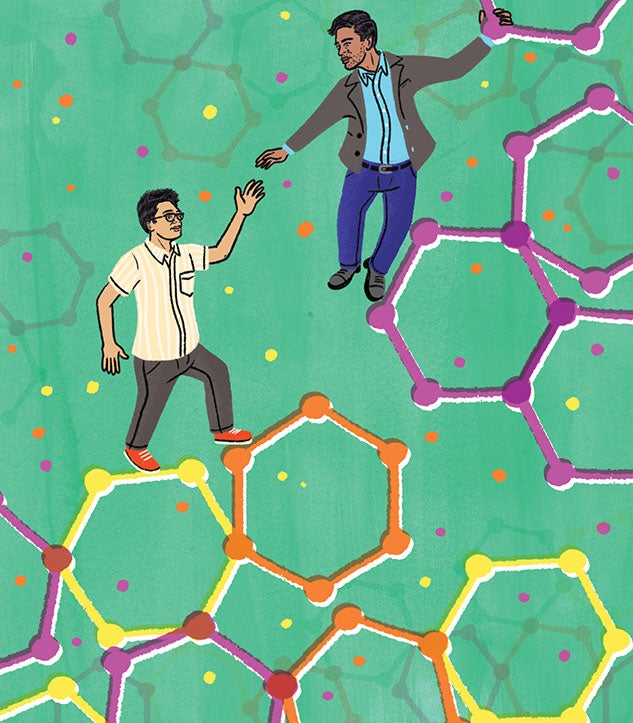Mentorship Magic
Finding an enthusiastic mentor helped Alex Hwang develop a love of research.

This fall, Alex Hwang ’19 will head to the University of Cambridge for one year of graduate study as a recipient of the prestigious Churchill Scholarship. A double major in physics and electrical engineering, Hwang will spend the year doing what he loves best — scientific research in nanophotonics, a field where nanotechnology meets optics.
“One of the things I’m proudest about is developing a passion while at Rice,” Hwang told Rice videographer Brandon Martin. “Finding a passion for research requires meeting really good people and really good mentors, which I did,” he said. In fact, Hwang met more than one mentor along the way, but the person who has had the most impact on his budding research career is Gururaj Naik — or Guru, as everyone in the lab calls him.
In the fall of his sophomore year, Hwang began seeking out academic opportunities beyond the classroom. He’d spent the summer at Stanford writing statistical programs to predict surgical recovery using light-emitting smartwatches. “I knew I was interested in nanoscience and nanotechnology,” Hwang recalled. So he began “cold-emailing” professors and asked to work in their labs. Naik had recently arrived at Rice as an assistant professor of electrical and computer engineering and was just setting up his lab group.
“I emailed him, and we hit it off,” said Hwang. “I really loved how he was super enthusiastic.” For the next three years, Hwang worked in the Naik lab as part of a group that develops new and novel nanophotonic devices.
“[Guru] basically gave me the framework to understand everything in this research area and about research in general. Things like how to be a good researcher, when to fight for [an idea], or when to try and think of a new idea and how to give a great talk,” he said.
When Hwang was a junior, Naik encouraged him to present his research at one of the biggest international conferences in their field. Hwang told his mentor that he didn’t think he could present his research in front of these august professors. Naik’s response: “You’ll be great!” This approach — pushing but not micromanaging — is what Hwang refers to as “the magic of Guru.”
From Naik’s perspective, he’s paying forward what he experienced in a doctoral program at Purdue University. “My Ph.D. adviser was amazing,” he said. “Every day, I remember him at least once. That was a privilege that I had and was one of the reasons I wanted to be in academia.”
Naik added, “[Alex] has been a big asset to my lab — bright, enthusiastic and ready to put in the hours and study. It only requires three P’s to be a successful researcher: problem-solving, patience and perseverance. I encourage students who want to push the frontiers of knowledge to knock on the doors of their professors.”
Hwang will enter a Ph.D. program in applied physics at Stanford after he completes his year at Cambridge. One day, he’ll be a mentor like Guru — encouraging while pushing his students to grow, telling them, “You’ll be great.”
- Lynn Gosnell, Katharine Shilcutt and Brandon Martin
